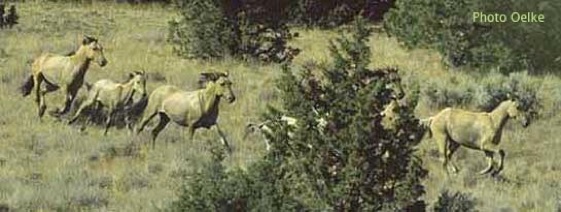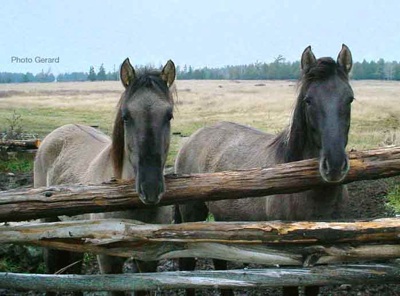VALID QUESTIONS AND RESPONSE
It seems as if you are saying first that very few horses of Sorraia blood (part or pure) came over to the Americas. In the next section, you mention the impurity and "contamination" of the mustang population. Finally, you make the statement that, with most mustangs being descendants of Iberian horses, and not having been tampered with by Man, we can reasonably assume a more unadulterated ancestry in those mustangs of good Sorraia type. Aren't those contradicting statements?
The statement that most likely only a small percentage of the horses the Spanish conquerors brought over were Sorraias, or of predominantly Sorraia blood, was made to acknowledge that they brought over horses of a variety of types and lineages. Which explains the presence of genes in American horses from which different types could be – and were – developed, by the environment and by selective breeding.
In addition, it is a known fact that mustangs were exposed to all kinds of "contamination" during the last few centuries - the government turned out Remount stallions to upgrade the mustangs, the ranchers turned loose whatever they saw fit to upgrade the mustangs with, other horses were turned loose because ranchers and farmers went bankrupt, etc.
Kiger mustangs – this wild herd from southeastern Oregon is special because more Sorraia-type mustangs survived in it than in any other herd
Regarding Sorraia-type mustangs, it is also a fact that we don't know of anyone in America's history who ever bred mustangs, or horses, of Sorraia type. Therefore, if we can still find Sorraia types today in the wild anywhere in the West it is not because of Man's efforts, but due to Mother Nature's influences. That is meant by a more "unadulterated ancestry", it means one "not tampered with by Man". The characteristics we find in these horses aren't present because someone bred for them - they were retained from the original type.
In my book "Born Survivors on the Eve of Extinction" I tried to explain how animals choose, if given a choice, mates of their own kind, and how climate and terrain in the West are largely similar to what these horses were adapted to in Iberia; in other words, how Nature encouraged and favored these horses in many areas as long as their survival wasn't made nearly impossible by Man.
Altamiro (Sorraia from Portugal) shortly after his arrival in Canada and one of
his mustang brides – it‘s pretty obvious that the Sorraia genes survived in some
mustang strains
"AMERICAN SORRAIAS"?
Somewhere I read about "American Sorraias" - is there such a thing? And if so, how? It is claimed that some "true foundation Spanish mustangs" are named "American Sorraias" and are identified by DNA evidence, and go back to an origin from Columbus' horses? Do these "American Sorraias" really play a role in the conservation of the Sorraia gene pool?
If the term "American Sorraia" is applied to mustangs of Sorraia type, then one can see the reasoning behind it, but that does not make it acceptable. Mustangs of Sorraia type are still that: mustangs. To call any mustang an "American Sorraia" is a slap in the face of the Portuguese, and of anyone engaged in preserving the Portuguese Sorraia horse. The rehabilitation of the Sorraia through breeding of Sorraia-type mustangs is still in its infancy and doesn't merit a term like that. It is conceivable, though, that some years down the road there will come horses from such breeding programs that are so good in type, and breed true, so that a term like that may be appropriate or legitimate.
There are no "American Sorraias". There are mustangs of Sorraia type, and that is why the SMS was established. Because Columbus brought horses to the New World that were, most likely, what is today known as "Sorraias", the similarity between some mustangs and the Sorraia horse is thought to stem from that source. Since then, all mustang populations have been exposed to all kinds of other blood, and there is no pure Sorraia among any of today's mustangs. It must be mentioned here, though, that the Portuguese Sorraias aren't pure, either, so it is conceivable that expert programs will produce horses in the future which will hold their own alongside the Portuguese horses.
In regard to the other question: There is no way that Sorraia ancestry can be proven by way of a DNA test. The Sorraia mtDNA type found in some mustangs only proves the existence of some Sorraia blood in the mustang population as a whole, which was introduced hundreds of years ago; it does not prove any direct relationship, and certainly is no basis for classification of a horse as a "Sorraia type". I had the tests done in the late 1990s to prove or disprove Sorraia blood in the mustang population, and that is the only thing the test can do. It offers no information about an individual horse's immediate ancestry, or relationship. For instance: As mtDNA is only inherited through the maternal line (bottom female line), a horse's ancestors in all other lines could have had other mtDNA. Such a horse might be no closer to the Sorraia than any other horse.
The real problem however is when people classify horses as Sorraia types which in reality do not conform to that type. Within the context of the "Sorraia Information Page" (www.sorraia.org) and the "Sorraia Mustang Info Page" (www.spanish-mustang.org) there are many examples describing in great detail the phenotype of the Sorraia horse as well as photos of purebred Sorraias, and Sorraia-type mustangs. When dedicating oneself to the preservation of Sorraia-type mustangs, it is important to maintain a standard of perfection, which can only be the morphology of the Sorraia. Any breeder who is creating a different set of defining criteria is pursuing a different agenda than the safeguarding and consolidation of the important atavistic qualities of the Sorraia, which have survived in certain North American mustangs, and actually diminishes and damages the preservation efforts already underway. Breeders are free to breed for whatever characteristics they desire, but it is misleading and pervasively false to label such horses "American Sorraias".
It is a misconception to think there were any "documented American Sorraia horses" - that is a concept that is simply unrealistic. It is also unrealistic to think Sorraia types, or let's say mustangs with a Sorraia inheritance, could only be found among registered horses, like SMR or SSMA horses. It is a fact that the best Sorraia types have been found in the Kiger herd of southeastern Oregon and the Sulphur Springs herd of southwestern Utah - which doesn't mean there couldn't occasionally be others just as good in other BLM herds.
There is no verified "true foundation Spanish stock" in the American mustangs. Horses of Iberian type, or Spanish type, or Sorraia type crop out in several BLM herds, as well as in horses bred within the Spanish Mustang Registry, and other such registries. And in no instance could it be verified whether such a horse got its characteristics by tracing back to stock of the Conquistadors, or rather to later Iberian imports.
One of the biggest problem is that so-called experts proclaim horses to be of Spanish type who don't really have a clue what a Spanish, or an Iberian, horse typically looks like. There are countless horses out there named "Spanish mustangs" which could as well be Mongolian ponies, Arab crosses, draft crosses, or whatever...


